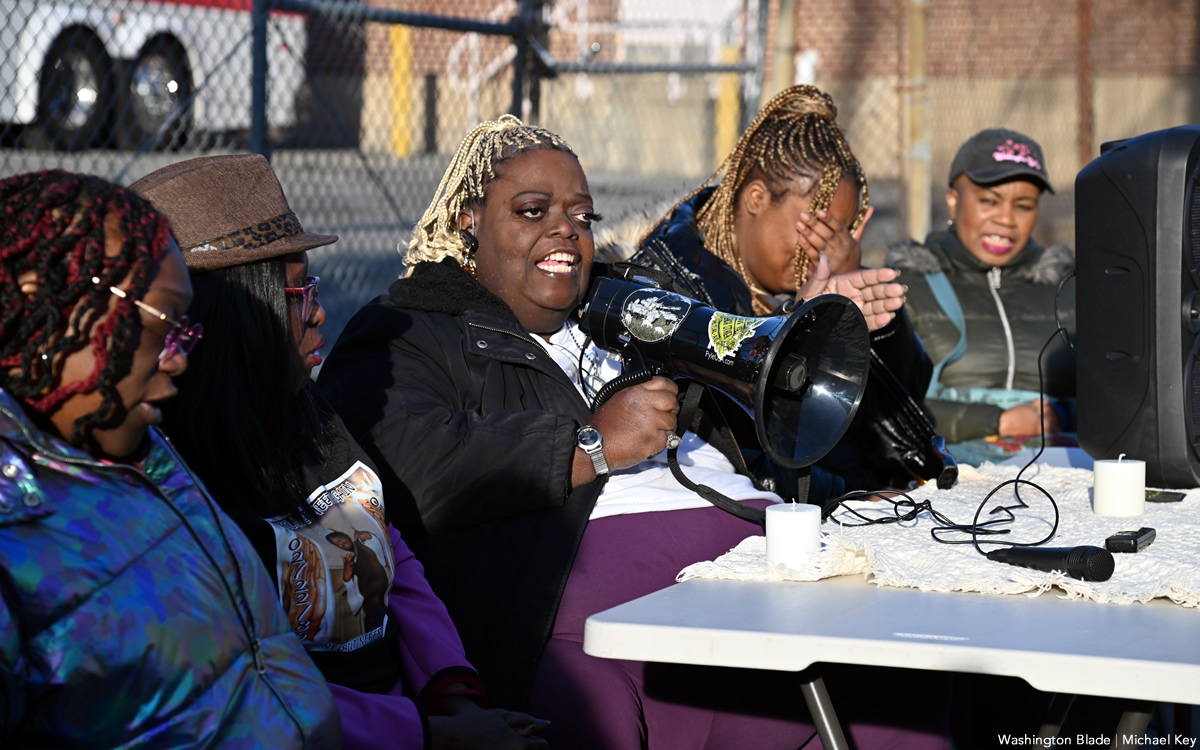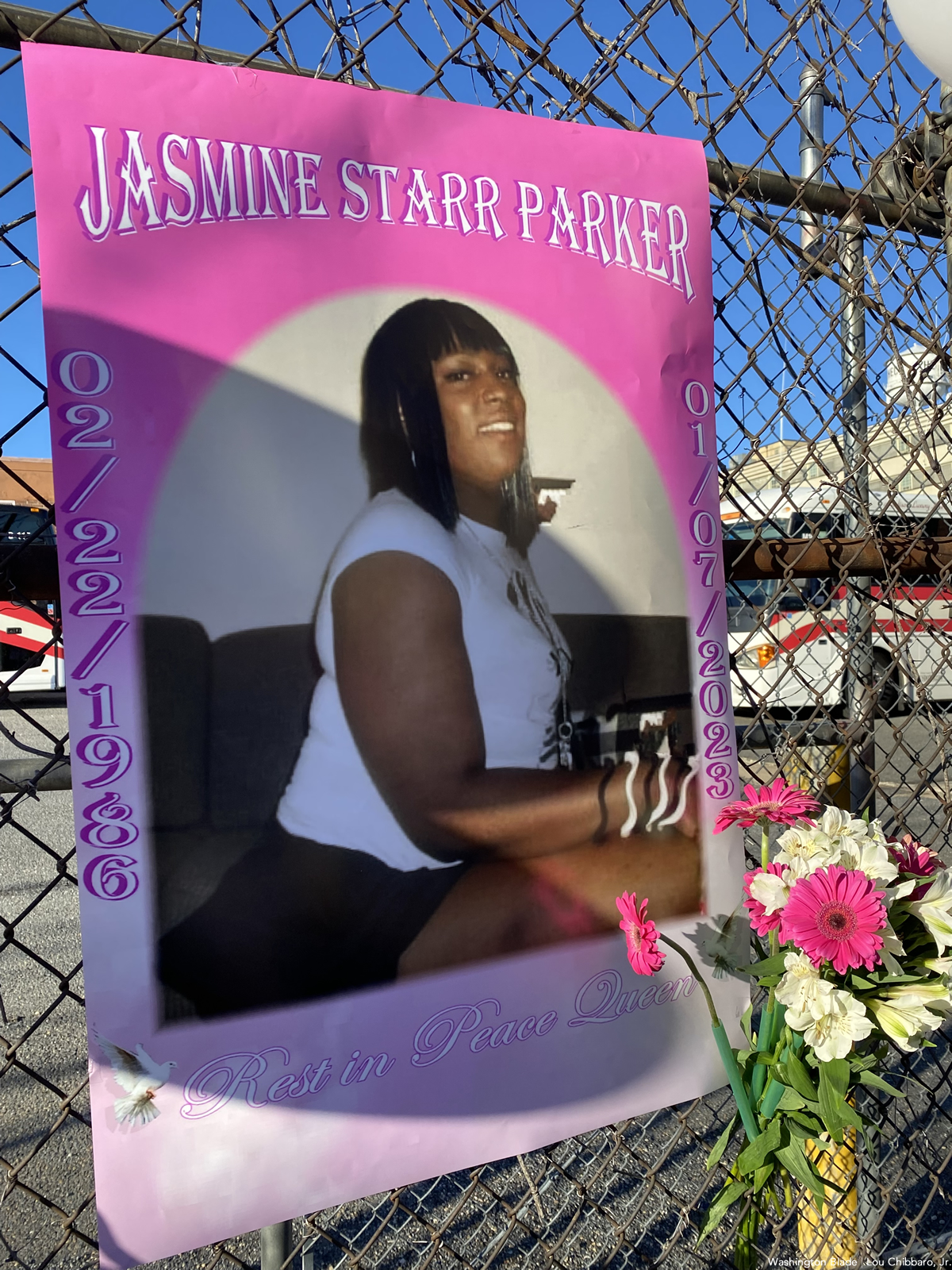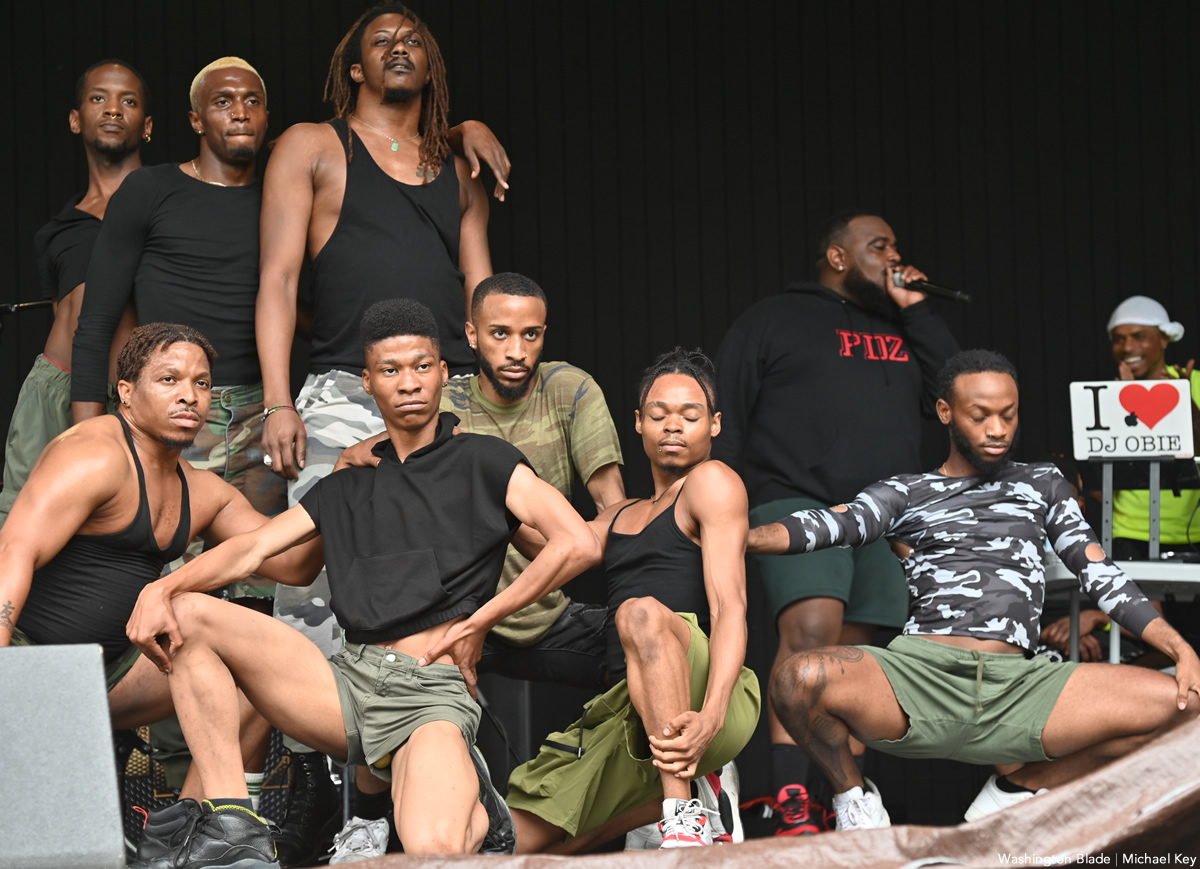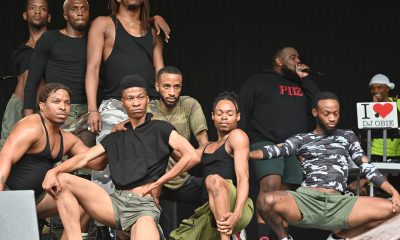District of Columbia
Slain D.C. trans woman honored at vigil
Family, friends gather on street where fatal stabbing occurred

Nearly 100 people turned out on Jan. 16 to honor the life of D.C. transgender woman Jasmine Star Parker at a vigil held on the 2000 block of Gallaudet St., N.E. where D.C. police say she was found stabbed to death at 3 a.m. on Jan. 7.
Among those participating in the vigil were Parker’s mother, brother, and sister, who have expressed their love and admiration for their deceased loved one.
Earline Budd, executive director of the D.C. group Empowering the Transgender Community (ETC), which organized the vigil along with D.C. Mayor Muriel Bowser’s Office of LGBTQ Affairs, told the gathering she knew Parker for many years and observed first-hand how Parker did her best to overcome discrimination and bias as a trans woman of color.
“We’re here today to remember a life taken away from us on Jan. 7, the life of Star Jasmine Parker,” Budd said. “Star was 36 years old. And Star deserved to live. So, today I want to take an opportunity to first of all let there be blessings in this place.”
Budd pointed out that the table where she and others who spoke at the vigil was set up on the sidewalk in front of a tall chain link fence were Parker’s body was found, with her blood still visible on the pavement.
D.C. police said that as of this time, they have no suspects and no known motive for the Jan. 7 homicide. A police spokesperson said the case was not listed as a suspected hate crime, but that could change if new information is obtained. Police are urging anyone with information about the case to call police at 202-727-9099.
A $25,000 reward is being offered for information leading to the arrest and conviction of the person or persons responsible for the murder.
Police initially identified Parker as Jasmine Star Mack. But family members and Earline Budd have since said that the beloved trans woman was known to the family as Jasmine Star Parker and preferred to be called Star. Parker was her birth surname.
Budd said Parker’s family informed her that a viewing and funeral service for Parker would be held Friday, Jan. 20, at Meridian Baptist Church at 5354 Sheriff Road in Capitol Heights, Md., beginning at 10 a.m. for the viewing and 11 a.m. for the service.
Among those attending the vigil were members of the D.C. police LGBT Liaison Unit, including Lt. Livio Rodriguez, director of the police Special Liaison Division, which oversees the LGBT Liaison Unit. Budd praised the LGBT Liaison members, saying they have been longtime supporters of the transgender community.
Parker’s mother, Arlene Witherspoon and her brother, Andre Tinsley, told those attending the vigil that Parker was raised in a religious family and she embraced God during many of her times facing hardship.
Parker’s sister, Pamela Witherspoon, was scheduled to speak at the vigil but told Budd she was too emotionally distraught to speak. In earlier interviews with WUSA 9 and the Washington Post, Pamela Witherspoon told how her sister faced hardship from discrimination in spite of her upbeat personality as someone who was “always singing and dancing — just trying to make you laugh,” she told WUSA 9.
“She wasn’t the type of person that did things to people,” WUSA 9 quoted Witherspoon as saying. “I don’t understand why. What did she do to deserve this? I’ll never understand that.”
Members of the community who spoke at the vigil during an open mic session, including longtime D.C. transgender activist Taylor Chandler and Center for Black Equity Deputy Director Kenya Hutton, said the city was not doing enough to address the problems of discrimination and threats of violence faced by members of the trans community, especially trans women of color.
“We have the ability to do more,” Chandler said. “There is no reason why we should be having this vigil for Star. We need to be giving more money to organizations that value Black trans lives.”
Japer Bowles, director of the Mayor’s Office of LGBTQ Affairs, said he agreed that the city should be doing more to address problems faced by the transgender community.
“Circumstances have put Star and many members of the community of D.C. in the danger that they’re in,” Bowles told the gathering. “And that is a failure from where I’m at, my job,” he said. “And it’s something that we are working on with the community.”
Added Bowles, “And this is D.C., the nation’s capital, where we have done more. And we have a record of doing more. And we need to do more,” he continued. “So, I promise we will do more.”
Sebrena Rhodes, the D.C. Advisory Neighborhood Commissioner representing the area where Parker was killed in the Ivy City neighborhood, said although the area is faced with crime, this was the first known homicide to take place in the neighborhood in a long time.
“I’m sure everyone loved her for who she is,” Roads said of Parker in her remarks at the vigil. “I’m deeply sorry. I live here in Ivy City. We all have to work together.”
Budd told the Washington Blade that the area is known as a place where some transgender sex workers congregate for what Budd and others who spoke at the vigil called survival sex work made necessary when discrimination and transphobia prevent trans women from finding other means of employment.
“Well, we talk about survival sex,” Budd said. “It’s not a secret. And you know, when people ask, what was she doing here, I say what does it matter? What does it matter? The fact that her life was taken, that’s what matters, whether she was here doing survival sex work or whatever.”
Rev. D. Amina B. Butts, pastor at D.C.’s LGBTQ-friendly New Hope Baptist United Church of Christ, appeared to sum up the sentiment of most of those attending the vigil by calling for an end to the hostility and violence faced by transgender people in D.C. and across the nation.
“It’s hard to find words of comfort,” she said. “There are no words to describe what has happened. It is a travesty of injustice. It needs to stop,” she continued. “Right now, in the name of the Divine, it needs to stop. We command that it stops.”

District of Columbia
New D.C. LGBTQ+ bar Crush set to open April 19
An ‘all-inclusive entertainment haven,’ with dance floor, roof deck

D.C.’s newest LGBTQ+ bar called Crush is scheduled to open for business at 4 p.m. on Friday, April 19, in a spacious, two-story building with a dance floor and roof deck at 2007 14th St., N.W. in one of the city’s bustling nightlife areas.
A statement released by co-owners Stephen Rutgers and Mark Rutstein earlier this year says the new bar will provide an atmosphere that blends “nostalgia with contemporary nightlife” in a building that was home to a popular music store and radio supply shop.
Rutgers said the opening comes one day after Crush received final approval of its liquor license that was transferred from the Owl Room, a bar that operated in the same building before closing Dec. 31 of last year. The official opening also comes three days after Crush hosted a pre-opening reception for family, friends, and community members on Tuesday, April 16.
Among those attending, Rutgers said, were officials with several prominent local LGBTQ organizations, including officials with the DC Center for the LGBTQ Community, which is located across the street from Crush in the city’s Reeves Center municipal building. Also attending were Japer Bowles, director of the Mayor’s Office of LGBTQ Affairs, and Salah Czapary, director of the Mayor’s Office of Nightlife and Culture.
Rutgers said Crush plans to hold a grand opening event in a few weeks after he, Rutstein and the bar’s employees become settled into their newly opened operations.
“Step into a venue where inclusivity isn’t just a promise but a vibrant reality,” a statement posted on the Crush website says. “Imagine an all-inclusive entertainment haven where diversity isn’t just celebrated, it’s embraced as the very heartbeat of our venue,” the statement says. “Welcome to a place where love knows no bounds, and the only color or preference that matters is the vibrant tapestry of humanity itself. Welcome to Crush.”
The website says Crush will be open Tuesdays and Wednesdays from 4 p.m. to 12 a.m., Thursdays from 4 p.m. to 2 a.m., Fridays from 4 p.m. to 3 a.m., Saturdays from 2 p.m. to 3 a.m., and Sundays from 2 p.m. to 12 a.m. It will be closed on Mondays.
Crush is located less than two blocks from the U Street Metro station.
District of Columbia
Reenactment of first gay rights picket at White House draws interest of tourists
LGBTQ activists carry signs from historic 1965 protest

About 30 LGBTQ activists formed a circular picket line in front of the White House Wednesday afternoon, April 17, carrying signs calling for an end to discrimination against “homosexuals” in a reenactment of the first gay rights protest at the White House that took place 59 years earlier on April 17, 1965.
Crowds of tourists looked on with interest as the activists walked back and forth in silence in front of the White House fence on Pennsylvania Avenue. Like the 1965 event, several of the men were dressed in suits and ties and the women in dresses in keeping with a 1960s era dress code policy for protests of the Mattachine Society of Washington, D.C., the city’s first gay rights group that organized the 1965 event.
Wednesday’s reenactment was organized by D.C.’s Rainbow History Project, which made it clear that the event was not intended as a protest against President Joe Biden and his administration, which the group praised as a strong supporter of LGBTQ rights.
“I think this was an amazing event,” said Vincent Slatt, the Rainbow History Project official who led efforts to put on the event. “We had twice as many that we had hoped for that came today,” he said.
“It was so great to see a reenactment and so great to see how far we’ve come,” Slatt said. “And also, the acknowledgement of what else we still need to do.”
Slatt said participants in the event who were not carrying picket signs handed out literature explaining the purpose of the event.
A flier handed out by participants noted that among the demands of the protesters at the 1965 event were to end the ban on homosexuals from working in the federal government, an end to the ban on gays serving in the military, an end to the denial of security clearances for gays, and an end of the government’s refusal to meet with the LGBTQ community.
“The other thing that I think is really, really moving is some of the gay staff inside the White House found out this was happening and came out to greet us,” Slatt said. He noted that this highlighted how much has changed since 1965, when then President Lyndon Johnson’s White House refused to respond to a letter sent to Johnson from the Mattachine Society explaining its grievances.
“So now to have gay people in the White House coming out to give us their respects and to say hello was especially meaningful to us,” Slatt said. “That was not expected today.”
Among those walking the picket line was longtime D.C. LGBTQ rights advocate Paul Kuntzler, who is the only known surviving person who was among the White House picketers at the April 1965 event. Kuntzler said he proudly carried a newly printed version of the sign at Wednesday’s reenactment event that he carried during the 1965 protest. It stated, “Fifteen Million Homosexuals Protest Federal Treatment.”
Also participating in the event was Japer Bowles, director of D.C. Mayor Muriel Bowser’s Office of LGBTQ Affairs. Bowles presented Slatt with a proclamation issued by Bowser declaring April 17, 2024, Mattachine Society Day in Washington, D.C.
“Whereas, on April 17, 1965, the Mattachine Society of Washington courageously held the nation’s inaugural picket for gay rights, a seminal moment in the ongoing struggle for LGBTQIA+ equality in the United States, marking the genesis of public demonstrations advocating for those rights and paving the way for Pride Marches and Pride celebrations worldwide,” the proclamation states.
About 30 minutes after the reenactment event began, uniformed Secret Service agents informed Slatt that due to a security issue the picketers would have to move off the sidewalk in front of the White House and resume the picketing across the street on the sidewalk in front of Lafayette Park. When asked by the Washington Blade what the security issue was about, one of the Secret Service officers said he did not have any further details other than that his superiors informed him that the White House sidewalk would have to be temporarily cleared of all people.
Participants in the event quickly resumed their picket line on the sidewalk in front of Lafayette Park for another 30 minutes or so in keeping with the 1965 picketing event, which lasted for one hour, from 4:20 p.m. to 5:20 p.m., according to Rainbow History Project’s research into the 1965 event.
Although the LGBTQ picketers continued their procession in silence, a separate protest in Lafayette Park a short distance from the LGBTQ picketers included speakers shouting through amplified speakers. The protest was against the government of Saudi Arabia and organized by a Muslim group called Al Baqee Organization.
A statement released by the Rainbow History Project says the reenactment event, among other things, was a tribute to D.C.-area lesbian rights advocate Lilli Vincenz, who participated in the 1965 White House picketing, and D.C. gay rights pioneer Frank Kameny, who founded the Mattachine Society of Washington in the early 1960s and was the lead organizer of the 1965 White House protest. Kameny died in 2011 and Vincenz died in 2023.
The picket signs carried by participants in the reenactment event, which were reproduced from the 1965 event, had these messages:
• “DISCRIMINATION Against Homosexuals is as immoral as Discrimination Against Negroes and Jews;”
• “Government Should Combat Prejudice NOT PROMOTE IT”
• “White House Refuses Replies to Our Letters, AFRAID OF US?
• “HOMOSEXUALS Died for their Country, Too”
• “First Class Citizenship for HOMOSEXUALS”
• “Sexual Preference is Irrelevant to Employment”
• “Fifteen Million U.S. Homosexuals Protest Federal Treatment”
District of Columbia
Organizers announce details for D.C. Black Pride 2024
Most events to take place Memorial Day weekend at Westin Downtown

The Center for Black Equity, the organizer of D.C. Black Pride, the nation’s first and one of the largest annual African-American LGBTQ Pride celebrations, announced this year’s event will take place Memorial Day Weekend from May 24-27.
The announcement, released April 16, says that most 2024 D.C. Black Pride events will take place at the Westin Washington, D.C. Downtown Hotel at 999 9th St, N.W.
“With the theme Black Pride Forever, the event promises a weekend filled with vibrant celebrations, empowering workshops, and a deep exploration of Black LGBTQIA+ history and culture,” the announcement says.
It says events will include as in past years a “Rainbow Row” vendor expo at the hotel featuring “organizations and vendors created for and by the LGBTQIA+ community” offering products and services “that celebrate Black excellence.”
According to the announcement, other events include a Health and Wellness Festival that will offer workshops, demonstrations, and activities focused on “holistic well-being;” a Mary Bowman Poetry Slam “showcasing the power and beauty of spoken word by Black LGBTQIA+ artists;” the Black Pride Through the Decades Party, that will celebrate the “rich history of the Black LGBTQIA+ movement;” and an Empowerment Through Knowledge series of workshops that “delve into various topics relevant to the Black LGBTQIA+ community.”
Also, as in past years, this year’s D.C. Black Pride will feature its “Opening Night Extravaganza” reception and party that will include entertainment and live performances.
The announcement notes that D.C.’s annual Black Pride celebration, started in 1991 as a one-day outdoor event at Howard University’s Banneker Field, has inspired annual Black LGBTQ Pride events across the United States and in Canada, United Kingdom, Brazil, Africa, and the Caribbean. More than 300,000 people attend Black LGBTQ Pride events each year worldwide, the announcement says.
Full details, including the official schedule of events, can be accessed at dcblackpride.org.
-

 Africa4 days ago
Africa4 days agoCongolese lawmaker introduces anti-homosexuality bill
-

 World4 days ago
World4 days agoOut in the World: LGBTQ news from Europe and Asia
-

 District of Columbia3 days ago
District of Columbia3 days agoReenactment of first gay rights picket at White House set for April 17
-

 Africa3 days ago
Africa3 days agoUgandan activists appeal ruling that upheld Anti-Homosexuality Act











